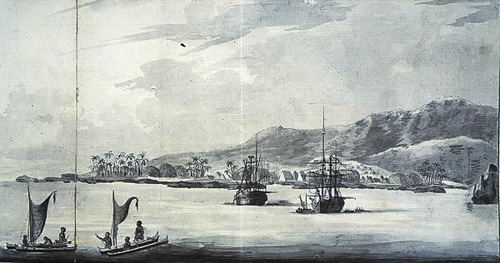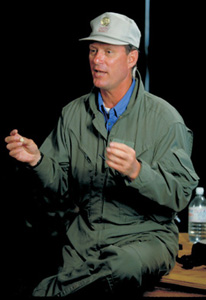There’s something about Dr. Robert Ballard that brings out the inner nine-year-old in all of us. Maybe it’s his stories of discovering buried treasure, giant worms, and underwater volcanoes. Or the robot submarines he designed to explore the sunken decks of the Lusitania, the Bismark, and Brittanica. Or the fact that he descended 12,000 feet in 1985 to find one of the most famous shipwrecks in history, the RMS Titanic.With over a hundred deep-sea expeditions to his credit, Ballard moves through the underwater landscape with the precision of a scientist and the excitement of an explorer. His new work in the Black Sea has unearthed ships that date to the time of Ancient Greece and the Phoenician trade routes. This legendary oceanographer is also the founder of JASON, a project that allows hundreds of thousands of children to learn about deep-sea exploration interactively. In this way, Ballard is able to share his sense of wonder and discovery with a whole new generation of explorers.
To read more about Bob Ballard click HERE.
 |
The desire to explore is the most natural thing in the world. We’re born with it. Can you imagine spending your whole life in a closed room, without ever trying the knob on the door? Not a chance! You’ll jiggle that handle at the first opportunity. Unfortunately, too often in childhood, the pilot light of our curiosity gets blown out. I was lucky; mine never did. I grew up in San Diego, surrounded by the sea, and I was obsessed with movies like 20,000 Leagues Under the Sea, Journey Beneath the Sea, Sea Hunt, Mr. Peabody and the Mermaid, and Creature from the Black Lagoon. I dreamt of travel and exploration, of great journeys and discoveries. Many of the characters I was introduced to then became my heroes, and remain so today: Jason and his Argonauts, Odysseus, Captain Nemo, and Captain James Cook. Mythical or real, they were all great explorers, and all of them were larger than life. My heroes weren’t perfect, but I think there’s something to be learned from the more flawed aspects of their personalities as well. Most of them didn’t ride into the sunset with a “Happily Ever After.” Cook died because he made a mistake. He turned his back, and got into a situation from which he couldn’t extract himself. Jason’s wife killed their children after he betrayed her. Nemo, fictional though he may be, was a very angry man. He didn’t process the anger, and it consumed him. Those are things to watch out for.
If I had to distill the one thing that I’ve learned from my heroes, it would be leadership. All of these men were great leaders. I always find myself asking, how did they get people to follow them into harm’s way—and how did they bring them back alive? Cook was proud of how few men he lost. A forty percent mortality rate was standard on most crews, but the numbers on his ships were much, much smaller. He worried about the people under his command, and took care of them. That, to me, is the sign of a great leader. Tragically, huge numbers of his crew died later of disease in the Dutch Indies; it broke his heart.
 |
| Drawing of explorers on Kealakekua Bay, 1779 (The National Archives Learning Curve (UK) ) |
Joseph Campbell (another one of my heroes, an explorer of the mind) has said that life is “the act of becoming”; one never arrives. Everyone’s on a journey, making a trip through time and space. Explorers—like Jason, and Odysseus, and Captain Cook—just do it in an orchestrated way. Their journeys are epic ones. I have found that their journeys have a predictable pattern to them, and I have found, over the course of my life, that mine have, as well.
All the great journeys begin with a dream. Christopher Columbus said, “I want to find a western route to India.” For Jason, it was the Golden Fleece. For me, it was the Titanic. That dream is the driving force, the impetus, the quest. Life is a giant quest, and in many cases, we never get the answer. But that should never extinguish the desire to know.
Once you’ve embarked on your journey, that’s when you discover how important preparation is, because Neptune will always test you. All of my heroes were tested. It took Odysseus ten years to get home! Preparation has a lot to do with how you survive the test. When you read Cook’s journals, you see a committed, intelligent, disciplined, patriotic man; I admire those qualities in him. He did his homework. And he was cool under fire, which is a necessity when you lead; for an explorer, it can often mean the difference between life and death. But it takes more than preparation or a cool head, because the hardest part of Neptune’s test is always the test of your heart, your passion.
My heroes have taught me that failure is a given, and it is the greatest teacher you’ll ever meet. The real question isn’t “How can I make it through life without screwing up,” but “What will I do when it happens?” Will I—can I—process the failure? Odysseus had enough passion to keep getting back up off the mat, no matter how many times he was knocked down. Jason had it, Cook had it, and Nemo had it. You have to have it, in order to pass the test.
When the test is passed, Neptune pulls back the veil of secrecy and there’s the truth. But the quest is not yet finished. As far as I’m concerned, the journey of a true explorer is not over until you have shared the truth you have discovered with the world. That’s what an explorer does—he comes back, and communicates what he’s learned. He educates. He doesn’t just say, “I had a great time.” He says, “I collected all this information, and I made all these maps, and I brought back something to share with society.” That process is vitally important, not just for the society it enriches, but for the explorer. Sharing what he’s learned releases him, so that he can dream again. That’s one of the reasons that I’m a big believer in passing the torch. There’s no question in my mind that the golden age of exploration is in front of us, not behind us. We’re reaching out with the Hubble telescope to the edge of the big bang. We’re probing the moons of Saturn. We’re looking for life on Mars. There’s a staggering amount still to learn, just about the inside of the human body alone. New frontiers are everywhere we look.
The next generation is going to smoke us. They’re going to blow us out of the water the way we blew our parents’ generation away. The school kids that I talk to, the graduate students who come out to sea with me—they’re the next Odysseuses, the next Cooks. It’s an honor to think that a story I tell them or something I can show them might inspire them the way the stories of Jason and Nemo inspired me. Because these kids are going to go where no one has gone before. They’re going to stand on our shoulders and see things we never dreamed of seeing—and I, for one, can’t wait.
Page created on 8/11/2014 6:11:34 PM
Last edited 8/28/2018 2:39:29 AM
Copyright 2005 by The MY HERO Project
MY HERO thanks Dr. Robert Ballard for contributing this essay to My Hero: Extraordinary People on the Heroes Who Inspire Them.
Thanks to Free Press for reprint rights of the above material.
ON THE BOOKS...
